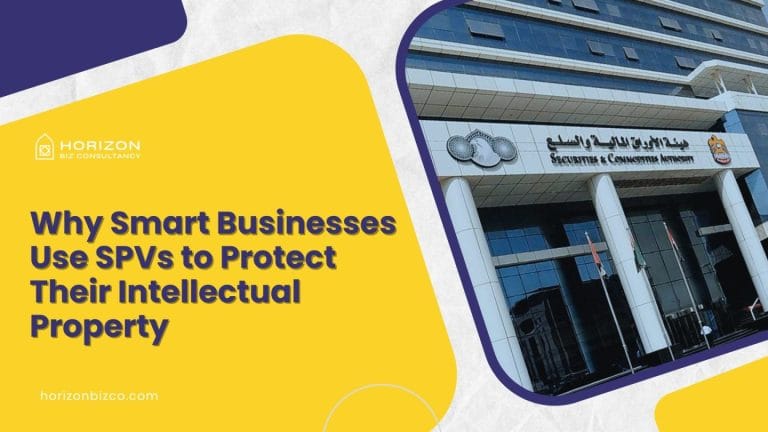Introduction
In today’s knowledge-driven economy, a company’s intellectual property (IP) its trademarks, patents, copyrights, software, and trade secrets, is often more valuable than its physical assets. Yet, many businesses leave these assets vulnerable by keeping them within their main operating company, where they are exposed to commercial risks.
Forward-thinking businesses are now moving their IP into Special Purpose Vehicles (SPVs) or holding companies, particularly in strategic jurisdictions like Abu Dhabi Global Market (ADGM) or the Dubai International Financial Centre (DIFC). This structure not only strengthens IP protection but also simplifies fundraising, partnerships, and global expansion.
Why Separate IP from Your Operating Company?
When your IP sits inside your main trading entity, it’s at risk. Lawsuits, debt, or unforeseen liabilities could put your most valuable assets on the line. By transferring IP to a dedicated entity, often an SPV, you create a protective shield.
Benefits include:
- Asset Protection: Safeguards IP from operational risks such as litigation or bankruptcy.
- Investor Confidence: Clean IP ownership improves due diligence and valuation.
- Licensing Flexibility: Easier to license to subsidiaries, partners, or third parties.
- Tax Planning: Certain free zones offer 0% corporate tax and treaty benefits.
How an SPV for IP Works
- Create an SPV in a jurisdiction with robust IP laws and investor-friendly regulations (e.g., ADGM, DIFC).
- Transfer IP Ownership from founders, employees, or contractors into the SPV through formal assignment agreements.
- License IP Back to the operating company for use in day-to-day business.
- Earn Royalties or other income through licensing arrangements while keeping the IP asset secure.
This structure keeps your operations and your core assets legally separate while allowing the business to continue using them without disruption.
Strategic Advantages for Growth and Investment
- Streamlined M&A and Fundraising: Investors can review IP holdings without sifting through operational complexities.
- Global IP Management: One SPV can hold IP for multiple countries and subsidiaries.
- Commercialization Opportunities: Easier to license, franchise, or partner internationally.
Transferring IP into the SPV: Assignment Agreements
A strong IP strategy starts with clear ownership. That means ensuring all IP created by founders, employees, and contractors is formally assigned to the company (or the SPV).
Common agreements include:
- Founder IP Assignments – Transfers all pre-company IP into the business.
- Employee Assignments – Ensures all IP developed during employment is owned by the company.
- Contractor Assignments – Transfers rights from third parties or freelancers.
- IP Purchases – Acquires IP outright from another entity or individual.
Joint Ventures and Shared IP
When partnering with other companies in a joint venture, IP ownership can get complicated. Clear agreements should define:
- Who owns pre-existing IP
- How the new IP will be jointly owned or assigned
- How costs and revenues will be shared
- Confidentiality and permitted uses
Failing to address these points upfront can lead to disputes that damage partnerships and stall projects.
Conclusion
Your intellectual property is the engine of your competitive advantage. Protecting it through a dedicated SPV or holding company is no longer just a legal formality; it’s a strategic move that strengthens resilience, attracts investors, and positions your business for sustainable growth. At Horizon Biz Consultancy, we help companies design IP structures that balance protection, flexibility, and global expansion goals.
FAQ’s
An SPV is a separate legal entity that holds specific assets, such as IP, shielding them from risks faced by the main operating company.
Both offer strong IP protection laws, 0% corporate tax, and internationally recognised legal frameworks.
Yes, typically through licensing arrangements with the operating company or third parties.
Through legal assignment agreements with founders, employees, contractors, or other IP owners.
No, startups and SMEs with valuable IP can benefit from an SPV structure just as much as large corporations.





